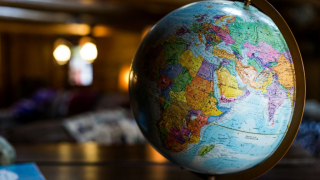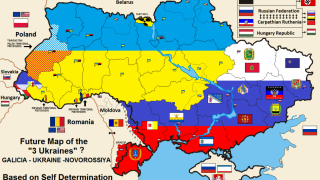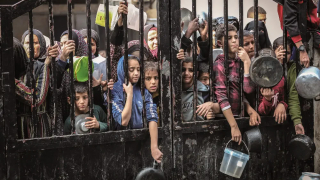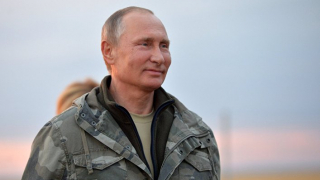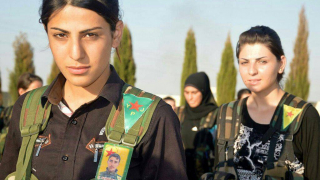Economist Professor Warren Mosler: "Sanctions against Russia make no sense: with free Gazprombank it's as if they weren't there"
In the structure of the modern Western world, wars currently no longer serve the purpose of settling scores between two countries, moved by the principle of self-determination of peoples. Rather, they are the excuse to justify geopolitical events aimed at the expansion of the power of those financial lobbies, for some time now unchallenged, commanding and deciding over the lives of a large part of the planet.
All people now know the response of the West to the outbreak of the conflict in Ukraine. Surely not in the style of the beneficial diplomacy required to settle - peacefully and in the interest of all - a conflict between a Superpower and a small State.
Quite the contrary, care was taken to ensure that the war would not be short, oblivious to the fact that the path taken could concretely expand the very conflict on a planetary scale.
Actually, this is happening. The most recent tough statements by Biden and Putin, as well as the sabotage of the Nord Stream pipelines in the Baltic Sea, leave little room for interpretation.
All of that brings us back to the first observation, namely that the dispute with Ukraine may hide purposes beyond those of securing the legitimate desire and right of peoples to belong to the nation that, by history and culture, they feel as their own.
For this reason, and to understand where the truth lies, a thorough postmortem is essential on what decisions the Mario Draghi and Janet Yellen duo made on behalf of the European and U.S. governments in the aftermath of the launch of the Special Military Operation President Putin launched into Ukrainian territory.
I am referring to all those sanctions imposed on Russia by the United States and the European Union. Mainly, the freezing of all foreign exchange reserves held by the Central Bank of Moscow with the Fed and the ECB, and its subsequent ouster from the central bank payments system.
As we know, the very originators and their puppies in the regime press dumped these measures on the unsuspecting populace as the "atomic bomb" that would quickly force the entire Russian economy to surrender. This, in turn, would force President Putin to immediately retreat from the occupied territories. Nevertheless, though continuing to send weapons to fuel death and destruction, awaiting the Kremlin's prospective and certain surrender, we had to take note of the stark reality: the financial sanctions, to date, do not seem to affect the Russian economy and plans in the slightest. Quite the other way, they devastatingly exacerbated the energy problem for the European continent, that, as we know, depends more than any other on gas from the Eurasian giant.
I use the term "exacerbated" intentionally because, other than what they would have us believe, the fuse to high prices on energy had already been triggered almost a year earlier, at the hands of the devils of financial speculation, as always left free to operate undisturbed by governments: sometimes inert, more often corrupt.
All the above said, and given how much distortion we had guessed on the matter of financial sanctions, we interviewed Prof. Warren Mosler (*) for clarification, especially with regard to the fact that the Russian credit institute Gazprombank, was left completely outside the imposed restrictions and free to operate on the payments system.
In our conversation (below) with Prof. Mosler (henceforth WM, ed.), we also discussed briefly the "digital dollar" issue, the subject of one of our recent articles:
CDC: Prof. Mosler, does it make sense to sanction a country like Russia that supplies us with a commodity as vital to our economy as natural gas?
WM: "To me it doesn't make sense at all: the right thing to do - for an importing <exporting> state - would be to conserve the commodity (in this case gas), while an importing state should engage in substitution through cheaper solutions."
CDC: What does freezing foreign exchange reserves mean for a central bank?
WM: "It means that the account holder cannot transfer funds abroad. If the Fed freezes it, Russia's (Central Bank, ed.) account is frozen, nothing more. The problem for Russia is that it cannot transfer those funds to make payments."
CDC : After the introduction of sanctions, in order to supply gas, Vladimir Putin explicitly required to be paid in rubles. What’s your opinion on the reasons why the Russian president made this condition in order not to cut off supplies?
WM : "I don't know what he was thinking, the end result does not change: by asking for rubles, the buyer of Russian oil or gas must first buy rubles and pay for them in euros or dollars.
If the Russian accounts in dollars and euros are blocked, he cannot buy rubles, so nothing changes.
If the West allows these accounts to be unlocked in order to buy rubles, it might as well leave them unlocked for the
selling oil or gas. So this makes no sense to me."
CDC: We have seen that, despite the sanctions, gas supplies continue to flow, mainly because Gazprombank has been kept inside the loop to make and receive international payments. Can the Central Bank of Russia, possibly liquidate and/or move its (currently blocked) reserves through Gazprombank?
WM: "If the accounts are kept with the Fed, Russia cannot transfer these funds."
CDC: Doesn't it seem to you that by keeping Gazprombank out of sanctions, this actually means that these sanctions don’t exist?
WM: "As a matter of fact, yes."
CDC: So what are the sanctions really upto?
WM: "Presumably to make things difficult for Russia by limiting Russian imports."
CDC: In your opinion, will the sanctions on Russia have the effects hoped for by those who devised them?
WM: "Definitely not!"
CDC: Janet Yellen, in a Treasury document, specified in concrete terms what the Central Bank digital currency will be. A digital dollar issued by the FED that can be held in accounts opened directly with the FED itself and convertible "one-for-one" with current paper dollars or reserve balances. Actually, what would it be like?
WM: "A payments system."
CDC: What do you think would be the purpose for which the CBDC (Central Bank Digital Currency) would be introduced. Could it be a way to eliminate cash and thus "black" payments and be able to freeze funds, more easily, through a centralized system?
WM: "It would appear so. If anything, I think they are more concerned about tax evasion."
As you have been able to read from Prof. Mosler's responses, sanctioning a country, technically preventing it from supplying us with a good that is basic to us, makes no logical sense. Indeed, we should be seriously concerned, should said country take conservative choices (in this case regarding gas). That is, should it decide to stop selling it to us for the specific purpose of reserving it for domestic use, with a view to possible future depletion.
Actually, this is what we are experiencing!
A gas shortage, madly provoked not by a precise will of the producing country but by those who are instead the beneficiary users of it. A totally reckless action mainly affecting European countries and their economic systems, which are devoid of credible alternatives at compatible costs.
I hope people can understand how all this is only the result of the demented choices of our rulers, who even dared to pass them off as necessary for our good. None of this is proven by economic doctrine, let alone the reality we are living in.
Thus, we are not being told the truth about financial sanctions: Gazprombank is for all intents and purposes outside any sanctions and free to operate like any other bank in the rest of the world.
This should lead us to realize that through Gazprombank, Russia can buy and sell anything it wants, as if it were basically not sanctioned at all.
I don't know whether we can realize the extent of that reality: on one hand we have Mario Draghi telling us, no longer than two weeks ago in front of the UN assembly, that "sanctions have had a disruptive effect on the Russian war machine and its economy". Even worse, he then stresses, "the impact of the measures is bound to grow over time, not least because some of them will come into effect only in the coming months. A weaker economy will make more difficult for Russia to react to the defeats piling up on the battlefield" [1]. On the other hand, we find out instead, that Moscow, is free to operate through its own banking institution, which the sanctioners deliberately left out of those sanctions.
Just to make it clearer for you, it is as if faced with a foreclosure order on your accounts, the bank leaves you free to operate, as if the order itself did not exist.
In short, we are facing a real farce, don't you think? A farce, however, that is undoubtedly concealing a purpose of economic, political and geopolitical power.
To make the whole world believe that by blocking the use of numbers on computers to an entity that can create indefinitely those same numbers (actually, what central banks are for), according to your logic, can it bring about the end of a conflict?
In light of the evidence available to us the answer we have is definitely NO!
Whether you pay for gas in dollars, euros or rubles, nothing changes. They are still electronic numbers, albeit with different names, running on central bank computers. If anything, the problem arises when gas no longer runs in the pipelines. People don't cook, wash or heat, to say nothing about the production system coming to a halt.
For the Central Bank of Russia, whether ENI pays Gazprom directly in euros or by buying rubles, the result does not change. The computers of the Institute ruled by Mrs. Elvira Nabiullina will anyway show account statements with the ECB in euros.
We’re been foled as we’ve always been for years about the scarcity of currency, the public debt to be repaid for by future generations; about taxes financing public spending, about markets deciding rates, about inflation as the result of the monetary policy of central banks and all the other frauds that have been created in order to steer the world to the interests of those with the power to steer it.
By Fabio Bonciani
Translation by Arrigo de Angeli
06.10.2022
(*) Warren Mosler, is an American economist and entrepreneur, formerly a hedge fund manager; an activity that allowed him to fully understand the functioning of modern monetary and accounting systems of Central Banks and a State, upto developing those concepts that have led him today to be considered the father originator of the most recent formulation of Modern Money Theory (MMT). He is co-founder of the Center for Full Employment and Price Stability, based at the University of Missouri Institute in Kansas City, through which he funds both university fellowships and research projects in economics at some of the most prestigious universities in the U.S., Europe, and Australia. In 2014 he joined the faculty of the University of Bergamo and in 2015 the University of Trento as a visiting professor
Modern Money Theory (MMT) actualizes the school of economic thought outlined by Abba Lerner, John M. Keynes, Hyman Minsky protagonist of the 20th Century, which underlies the construction of the welfare state and an economy that aims to achieve full employment in a context of widespread welfare.
NOTES
[1] Draghi at UN, Russian referenda another violation of law - Last Hour - ANSA


